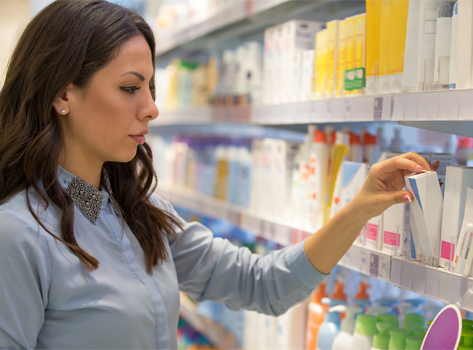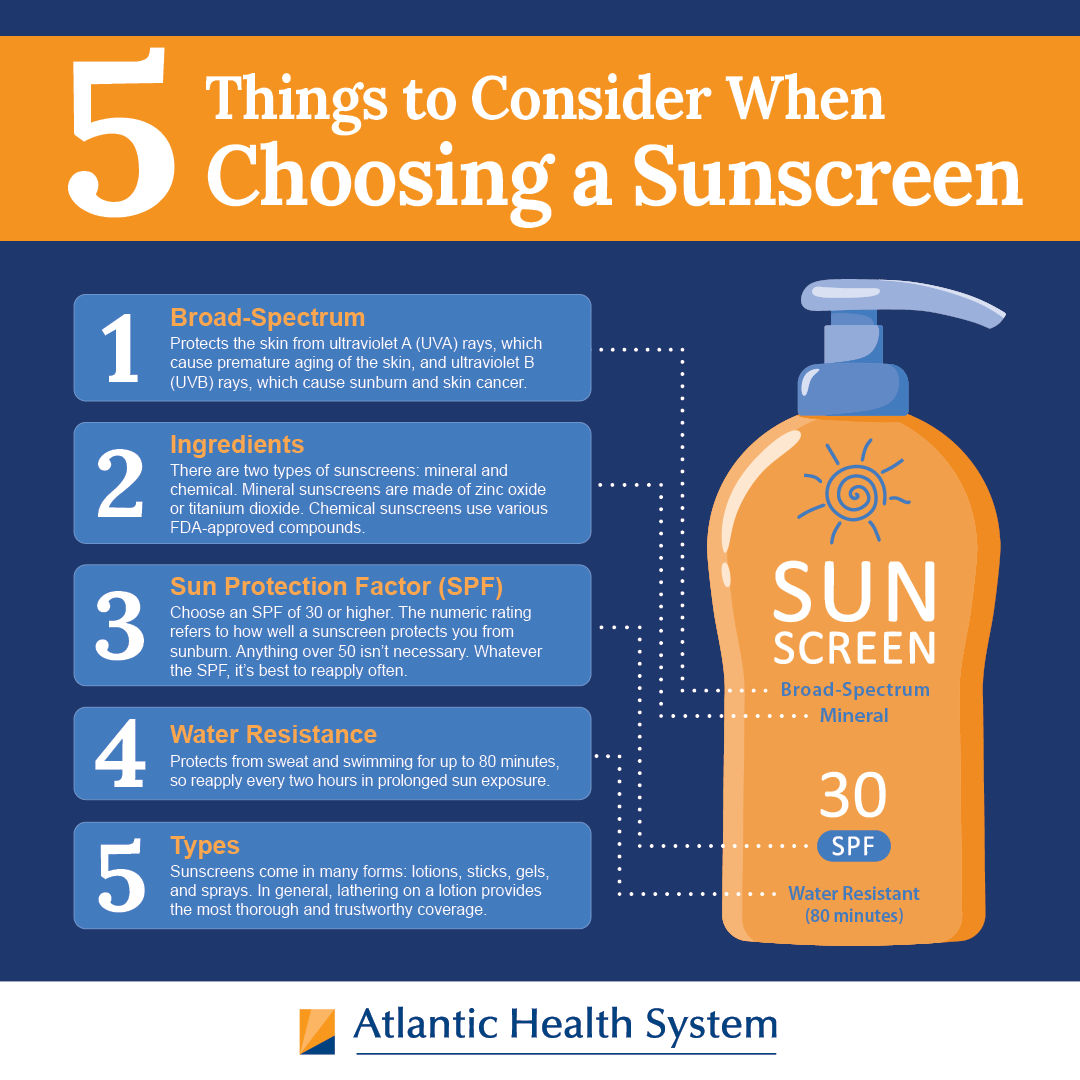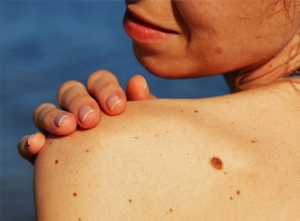
When it comes to selecting a sunscreen, there are hundreds of brands on the shelves with varying amounts of SPF protection that shout “safe and effective.” How to choose which one and how to know what you really need to protect your skin? Irene Rossmer, MD, a surgical oncologist at Atlantic Health System, helps sort it out for you.
“Reducing your exposure to ultraviolet rays (UV) will protect your skin from sunburn, long-term skin damage, and skin cancer,” says Dr. Rossmer. She explains that regardless of your age or skin tone, it’s important to get in the habit of using skin protection to safely enjoy the outdoors. “Anything is better than nothing, so find something that works for you and be consistent about it.”
Below are five tips to help you find the best options:
1. Broad-Spectrum
Choose a broad-spectrum sunscreen that will protect your skin from ultraviolet A (UVA) rays, which cause premature aging of the skin, and ultraviolet B (UVB) rays, which cause sunburn and skin cancer.
2. Ingredients
There are two types of sunscreens — mineral and chemical. Each filters UV rays differently. Mineral sunscreens, made of zinc oxide or titanium dioxide, sit on top of the skin and create a barrier of protection by deflecting the sun’s UV rays. Since they don’t absorb into the skin, they can look and feel a little filmy. Chemical sunscreens contain active ingredients that penetrate the skin and use various FDA-approved sun-filtering compounds that absorb UV rays, preventing them from penetrating the surface of the skin.
3. Sun Protection Factor (SPF)
Look for a product with an SPF of 30 or higher. The numeric rating refers to how well a sunscreen protects you from sunburn. Anything over 50 isn’t necessary.
4. Water Resistance
The FDA has banned manufacturers from claiming a sunscreen is waterproof, but make sure your choice is water-resistant. Products that are water-resistant from sweat and swimming will remain effective for up to 80 minutes. This means you need to reapply every two hours if you’re sweating, swimming, or have prolonged sun exposure.
5. Types
Sunscreens come in many forms: lotions, sticks, gels, and sprays. In general, lathering on a lotion provides the most thorough and trustworthy coverage. Aerosols blow into the air when applying them, which can leave spotty coverage. Sticks and gels can get messy and even melt in extreme heat.
Sun Smart
To keep your body cool and your skin safe, find shade — especially between 10:00am and 4:00pm. Lightweight clothing can also help reflect the sun. In fact, some clothing brands now have ultraviolet protection factor (UPF) ratings, which indicate the percentage of blocked UV rays. A wide-brimmed hat will protect your face and neck. And sunglasses with UV protection are more than a fashion statement, they help shield against light sensitivity and protect your vision.
“These recommendations apply to newborns and infants, too,” says Dr. Rossmer. “The best way to protect fragile young skin is to keep a baby in the shade, covered in clothes and a hat. Of course, if you can’t avoid the sun, use a mineral-based sunscreen formulated for babies and carefully apply it to exposed skin.”
Protection That Works
Dr. Rossmer also stresses that the proper way to measure the correct amount of sunblock is a shotglass-size amount of sunscreen applied to exposed skin 30 minutes before going outdoors. Reapply this same amount every two hours, or sooner if you are sweating or swimming. She also recommends that all adults should see a dermatologist annually for a skin cancer checkup.
“Even if your skin doesn’t burn easily, sun damage can show up in the form of premature aging, wrinkles, sunspots, and skin cancer,” says Dr. Rossmer. “As a surgical oncologist, my patients with skin cancer often ask what sunscreen is best to prevent further problems. I tell them the best sunscreen is the one they’re using. The one they’re consistently applying to their skin. The one they’ve made part of their skincare routine — every single day.”
Be Proactive About Your Health
To stay safe and healthy, it's good to have a primary care provider who knows and understands your health history and wellness goals.
Related Articles
Your Healthy Summer Guide
Atlantic Health System is your healthy summer guide to a safe and fun season. From helpful tips to preventive and urgent care, we've got you covered for whatever summer brings.
Protect Your Skin from Sun Damage this Season
Summertime activities bring us out in the sun. Whether it’s time spent at the beach, pool, park, or garden, it’s important to protect your skin from the glare of ultraviolet (UV) rays -- and lower your risk of potential skin damage.
How to Spot Melanoma: The Early Warning Signs of Skin Cancer
Melanoma is less common than other skin cancers, but it’s more dangerous if not treated early. Learn the early warning signs and how to spot melanoma.
Are You Drinking Enough Water?
Learn a simple way to monitor your hydration levels this summer and check out these helpful tips to ensure you’re getting enough fluids.
Avoid Heat Exhaustion this Summer
The summer heat and humidity sneak up on us. It is important to recognize the symptoms of heat exhaustion and heat stroke so you can protect yourself and those around you.





